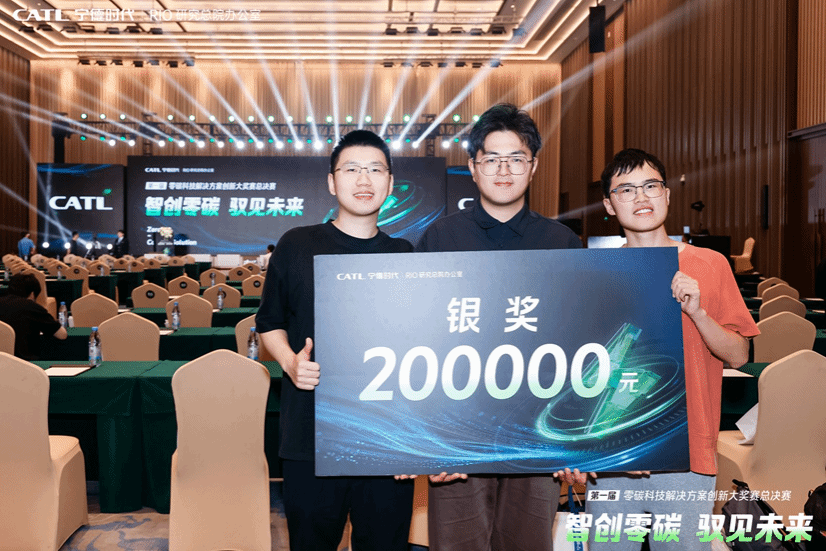Yong Yang's team of graduate students won a silver award at the First “Zero-Carbon Technology Solutions Innovation Grand Prix”
From May 13 to 15, 2025, the finals of the First “Zero-Carbon Technology Solutions Innovation Grand Prix” were held in Ningde, Fujian Province. This competition was jointly organized by Contemporary Amperex Technology Co., Limited (CATL) and the National Engineering Research Center for Electrochemical Energy Storage Technology. The event spanned a full year and included three stages: the preliminary round, the semi-finals, and the final. The competition featured five major tracks with a total of 68 subtopics, attracting 325 teams and 1,144 participants. Contestants came from renowned domestic and international institutions such as Tsinghua University, University of Science and Technology of China, The Chinese University of Hong Kong, The Hong Kong University of Science and Technology, City University of Hong Kong, Stanford University, and the National University of Singapore, as well as institutes under the Chinese Academy of Sciences, including the Institute of Chemistry, Institute of Process Engineering, Institute of Coal Chemistry, and Ningbo Institute of Materials Technology and Engineering. Approximately half of the participants held doctoral degrees or higher.

After three intense rounds of evaluation and competition, the contest ultimately awarded 1 Gold Prize, 3 Silver Prizes, 7 Bronze Prizes, and 14 Excellence Prizes. Among them, our research team won the Silver Prize with the proposal titled “Smart Acceleration, Precise Insight: A Multidimensional Exploration of Accelerated Aging Methods for Lithium-Ion Batteries in Energy Storage Applications”, placing 2nd among the 89 finalist teams. Team members included Yonggang Hu (team leader, direct-entry Ph.D. student in Energy Chemistry, Class of 2020), Shijun Tang (Ph.D. student, School of Energy), Yuanzhe Tao (Master’s student, School of Chemistry), Meifang Ding, Zhifeng He, Fangmei Wen, Ke Zhang, Yufan Peng, Huiyan Zhang, Yiqing Liao, Yuli Liang, and Jiahao Wu. The team was supervised by Professors Yong Yang and Zhengliang Gong.
The “Tools & Techniques Track” of this year’s competition focused on fast prediction methods, tools, characterization techniques, and diagnostic indicators for key performance attributes based on structure–property relationships in the field of electrochemical energy. Seventeen topics were offered within this track, and our team selected the topic “Development of Accelerated Methods for Long-Term Cell Lifetime Evaluation.”
As battery design lifespans extend to 10 or even 20 years, lifetime assessment has become the most time-consuming aspect of cell development, currently relying on extrapolation from over six months of cycling or storage data. In response, our team constructed and validated a comprehensive quantitative evaluation and characterization framework composed of six non-destructive diagnostic and post-mortem characterization techniques. Under multidimensional accelerated aging scenarios defined by usage type, stress factors, and key degradation variables, we achieved an in-depth analysis of rapid degradation mechanisms in lithium-ion cells. Based on characteristic datasets from cells subjected to different accelerated aging protocols, we further employed machine learning to preliminarily realize high-accuracy degradation classification and prediction. This work provides an important technical solution for the advancement of accelerated aging analysis in energy storage cells, contributing to the national goals of energy storage technology development and carbon neutrality through a paradigm of scientific research.
